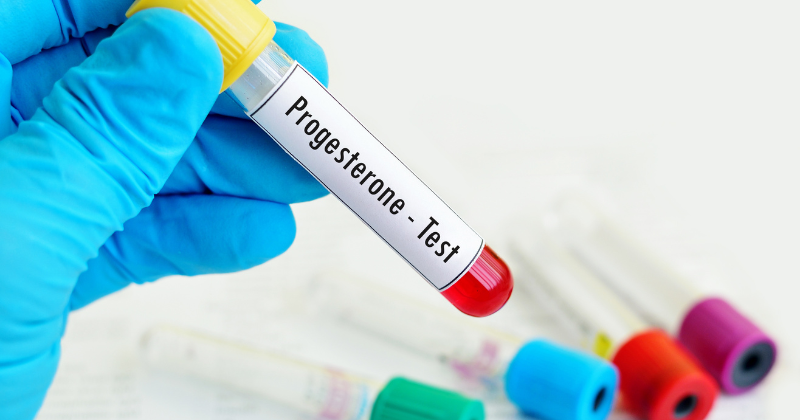Getting pregnant and having a healthy baby can be challenging. Many women worry about miscarriage, especially early on. Did you know that progesterone plays a massive role in a healthy pregnancy? But what exactly does progesterone do? How can you tell if your levels are okay? And what can you do to make sure you have enough?
This blog post is your go-to guide for understanding progesterone’s importance for a healthy pregnancy in 2025.
What is Progesterone?
Okay, let’s break down what progesterone is. Simply put, progesterone is a hormone. Hormones are like chemical messengers in your body. They tell different parts of your body what to do. Progesterone is an essential hormone for women.
- Progesterone is made mainly in the ovaries. These are the two small organs in a woman’s lower belly where eggs are stored.
- Once a woman is pregnant, the placenta also starts making progesterone. The placenta is a unique organ that grows during pregnancy to help the baby grow.
You might be surprised that progesterone does more than help with pregnancy. It’s also a key component of the menstrual cycle, during which the body prepares for a possible pregnancy.
- Progesterone helps thicken the lining of your uterus, where a fertilized egg would implant.
- If you don’t get pregnant, progesterone levels drop, and this triggers your period.
Progesterone is also super important in early pregnancy. It helps your body prepare for a baby and then supports it as it grows. Sometimes, women don’t make enough progesterone alone, so they need to take progesterone supplementation.
- Progesterone supplements can help women get pregnant and stay pregnant.
- This is especially important for women going through fertility treatments like IVF or those who have had miscarriages in the past.
Interestingly, progesterone also plays a crucial role in gestational and traditional surrogacy. Surrogacy is when another woman carries a baby for someone who can’t.
- Progesterone is essential for the surrogate to maintain a healthy pregnancy.
- If you’re considering surrogacy, a Florida surrogacy program can provide you with more information and support.
As you can see, progesterone production is vital for many aspects of women’s reproductive health. The following section will dive deeper into how progesterone supports a healthy pregnancy.
Progesterone’s Role in Pregnancy
Progesterone is like a superhero for pregnancy!
It has many important jobs to do at every stage. Let’s take a closer look:
Early Stages:
Think of progesterone as getting your body ready to welcome a baby. Here’s how:
- Prepping the Uterine Lining: Progesterone helps thicken the uterine lining. This lining is like a soft, comfy bed for a fertilized egg to implant and grow. If the lining isn’t thick enough, the egg might not be able to stick, and pregnancy won’t happen.
- Preventing Uterine Contractions: Progesterone also helps keep the uterus calm and relaxed. It prevents contractions, which are the tightening of the muscles in the uterus. This is important because early contractions can lead to miscarriage.
- Developing the Placenta: Progesterone helps the placenta grow. The placenta is a unique organ that connects the mother and the baby. It provides the baby with oxygen and nutrients and takes away waste.
Throughout Pregnancy:
Progesterone continues to be critical throughout the entire pregnancy. It helps:
- Support Fetal Growth: Progesterone helps the baby grow and develop properly.
- Maintain the Pregnancy: It keeps the uterine lining thick and prevents contractions, helping to prevent miscarriage and preterm labor.
- Prepare for Labor and Breastfeeding: Progesterone also helps your body get ready for labor and breastfeeding.
It’s incredible how much this one hormone does! But what happens if your body doesn’t produce progesterone enough? We’ll explore that in the next section.
Sneak Peek: Did you know that progesterone levels can also be affected by things like birth control pills?
We’ll talk more about that later. And if you’re curious about surrogacy FAQs, like “How many times can you be a surrogate mother? ” We’ll discuss that, too!
Remember that while the ovaries and placenta are the leading producers of progesterone, your adrenal glands (small glands near your kidneys) also make a small amount. And if you’re having trouble getting pregnant, fertility treatment often involves progesterone supplements to help support a healthy pregnancy.
Finally, you might hear doctors talk about the corpus luteum. This temporary structure forms in the ovary after an egg is released. It’s a key source of progesterone in early pregnancy.
Progesterone Deficiency
We’ve seen how fantastic progesterone is for pregnancy. But what happens if you don’t have enough?
This is called progesterone deficiency, and it can cause some problems.
Causes of Progesterone Deficiency:
There are a few different reasons why someone might have low progesterone.
Here are some of the most common causes:
- Ovulation Disorders: Sometimes, the ovaries don’t release an egg each month as they should. This is called anovulation, and it can lead to low progesterone. Polycystic ovary syndrome (PCOS) is one example of an ovulation disorder.
- Luteal Phase Defect: The luteal phase is the time between ovulation and your period. If this phase is too short, your body might not have enough time to make enough progesterone.
- Obesity: Being overweight or obese can affect hormone balance and lead to lower progesterone levels.
- Age: As women age, their ovaries naturally produce less progesterone. This is especially true as they approach menopause.
- Stress: When stressed, your body releases a hormone called cortisol. High levels of cortisol can interfere with progesterone production.
- Thyroid Issues: Problems with your thyroid gland, which controls your metabolism, can also affect progesterone levels.
Symptoms of Progesterone Deficiency:
It’s essential to pay attention to your body and notice any unusual symptoms. Here are some signs that you might have low progesterone:
- Spotting or Bleeding: It could be a sign of low progesterone if you notice spotting or bleeding between periods or during pregnancy.
- Miscarriage: Unfortunately, low progesterone can increase the risk of miscarriage, especially in the early stages of pregnancy.
- Preterm Labor: Low progesterone can also increase the risk of preterm labor when labor starts too early.
Risks of Progesterone Deficiency:
Progesterone deficiency can have some serious consequences, including:
- Increased Risk of Pregnancy Complications: Low progesterone can lead to problems like miscarriage, preterm labor, and ectopic pregnancy (where the fertilized egg implants outside the uterus).
- Emotional Distress: Dealing with infertility or pregnancy loss can be emotionally challenging and can take a toll on your mental health.
If you’re concerned about progesterone deficiency, talk to your doctor. They can do a blood test to check your progesterone levels.
Important Note: While progesterone delivery injected is a standard supplementation method, it’s crucial to discuss this with your doctor.
They can determine the correct dosage and method for you. Also, remember that progesterone supplements are not a magic solution for all infertility treatments. It’s essential to address the underlying causes of infertility. Finally, if you’re considering the surrogacy process, understanding progesterone’s role is crucial.
Surrogates often require progesterone supplementation, especially in the early stages of pregnancy, to ensure the best possible outcome. Always consult with a qualified healthcare professional for personalized guidance. Remember, there is currently only FDA-approved progesterone for intramuscular injection.
Other forms, like oral or vaginal progesterone, may be used “off-label,” meaning they haven’t been specifically approved for that use by the FDA. Always discuss the risks and benefits with your doctor.
Progesterone Testing and Monitoring
It’s important to know if your progesterone levels are healthy, especially if you’re trying to get pregnant or have had problems in the past.
Luckily, there are ways to check your progesterone levels.
When to Test:
Your doctor might suggest a progesterone test if:
- You’re having trouble conceiving: If you’ve been trying to get pregnant for a while without success, low progesterone could be a factor.
- You have a history of miscarriage: If you’ve had one or more miscarriages, your doctor might want to check your progesterone levels to see if that played a role.
- You have symptoms of low progesterone: If you’re experiencing symptoms like spotting, irregular periods, or mood swings, your doctor might check your progesterone levels to rule out a deficiency.
Types of Tests:
There are a couple of ways to test your progesterone levels:
- Blood test: This is the most common way to check progesterone levels. A nurse or technician will take a small sample of blood from your arm and send it to a lab for analysis.
- Saliva test: This is another option, but it’s less standard than a blood test. You collect a saliva sample at home and send it to a lab for testing.
Interpreting Results:
Once you get your test results, your doctor will help you understand what they mean. Progesterone levels can vary throughout your menstrual cycle and pregnancy. What’s considered “normal” depends on several factors, including:
- Where you are in your cycle: Progesterone levels are naturally higher after ovulation and during pregnancy.
- Your age: Progesterone levels tend to decline with age.
- Whether you’re pregnant: If you are pregnant, your progesterone levels will be much higher than if you’re not.
- The lab that did the testing: Different labs may have slightly different ranges for normal progesterone levels.
Remember: Progesterone is a hormone that works closely with other female sex hormones like estrogen.
It’s all about balance! Your doctor will consider your overall hormone profile and medical history when interpreting your results.
Important Note for Surrogate Mothers: If you’re a surrogate mother, monitoring your progesterone levels is especially important. This helps ensure a healthy pregnancy for both you and the baby. Your doctor will likely monitor your levels closely throughout the weeks of pregnancy, especially in the early stages.
Progesterone and Pregnancy in 2025
It’s 2025, and the world of medicine is constantly changing and improving!
This includes how we understand and use progesterone to help women have healthy pregnancies.
Personalized Medicine:
- Genetic Testing: Doctors can now use genetic testing to learn more about your needs. This helps them create a personalized plan for progesterone treatment that is just right for you.
- Tailored Treatments: Instead of a one-size-fits-all approach, doctors can now tailor progesterone treatments to your specific situation. This might mean adjusting the dosage or how you receive progesterone (like pills, injections, or gels).
New Delivery Methods:
- Slow-Release Injections: Scientists are developing new ways to give longer progesterone. This means fewer injections and more convenience for you!
- Patches: Imagine wearing a patch on your skin that delivers progesterone! Researchers are working on this technology to make taking progesterone even easier.
Research and Development:
- Ongoing Research: Scientists are always learning more about progesterone and its effects on pregnancy. This research will lead to better ways to use progesterone to help women have healthy babies.
- Improving Outcomes: The goal is to use this new knowledge to reduce the risk of miscarriage and other pregnancy complications.
Important Note for Surrogates:
- Surrogate Locations: If you’re considering becoming a surrogate, choosing a reputable agency and location with supportive laws and regulations is essential. Surrogate locations vary in their requirements and support systems.
- Egg Donation: Becoming an egg donor in Florida or other states can be a rewarding experience for those interested in helping others build families. Be sure to research the process and requirements thoroughly.
The Future is Bright:
With all these advancements, the future of progesterone and pregnancy looks bright! We can expect to see even more personalized and effective treatments. This means more women will be able to have healthy pregnancies and healthy babies.
That Just About Does It
That’s a wrap on our journey through the world of progesterone and pregnancy!
We’ve learned that progesterone is a super important hormone for a healthy pregnancy. It helps your body prepare for a baby and supports it as it grows. If you don’t have enough progesterone, it can increase the risk of problems like miscarriage and preterm labor. But don’t worry! There are ways to check your progesterone levels and get treatment if needed.
Always talk to your doctor if you have any concerns about your progesterone levels or your pregnancy. They are your best resource for personalized advice and support on your journey to motherhood.
Frequently Asked Questions
What is the primary function of progesterone during pregnancy?
Progesterone is essential for preparing your body for pregnancy and supporting a growing baby. It helps thicken the uterine lining for implantation, prevents early contractions, and endorses the placenta’s development.
How can I tell if my progesterone levels are low?
Symptoms like irregular periods, spotting, mood swings, and difficulty conceiving can indicate low progesterone. Your doctor can order a blood test to confirm this.
Can I boost my progesterone levels naturally?
Yes! Eating a healthy diet, managing stress through techniques like yoga, regular exercise, and ensuring enough sleep can all contribute to healthy progesterone levels.
What are the different ways progesterone supplements can be taken?
Progesterone supplements come in various forms, including oral pills, injections, and vaginal gels or suppositories. Your doctor will recommend the best option for your needs.
What are the latest advancements in progesterone treatment?
Personalized medicine and new delivery methods are changing how we use progesterone. Genetic testing helps tailor treatments, while slow-release injections and patches offer more convenient options for the future.
Wendy Arker entered the field of infertility with a huge heart and passion to guild others on their quest to grow their own family after her personal journey with infertility and turning to egg donation and sperm donation to create her own family. Being a single-mother-by-choice, Wendy understands firsthand the unique way families are built. Whether you’re a married couple, single, or LBGTQ, Creative Love is committed to assisting you.




























